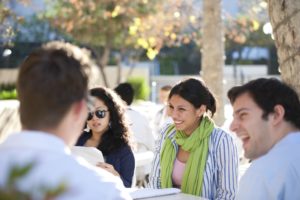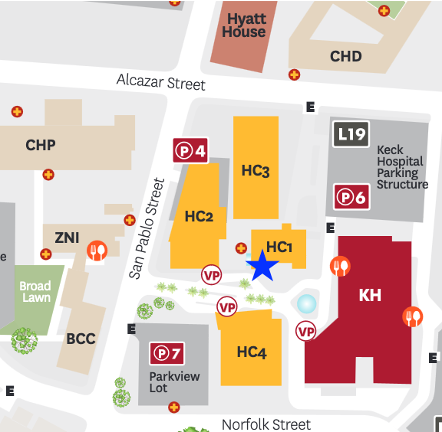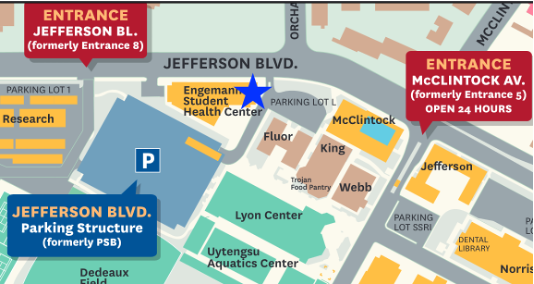
Post pandemic, re-building communities across USC has been recognized as an important priority for the Keck School of Medicine, which has launched an Office of Well-being.
As part of these efforts, the Department of Stem Cell Biology and Regenerative Medicine has introduced the Well-being Initiative “Collaborate, Celebrate, Regenerate,” which aims to foster collaborations, build community, strengthen belonging, celebrate successes, and enhance professional and educational fulfillment.
During regular meetings with the Well-being Director, committee delegates will identify and reduce barriers to the community’s well-being and help department members find greater shared purpose and joy in their work.
Well-being Committee
Well-being Director: Francesca Mariani, PhD
Junior faculty delegates: Giorgia Quadrato, PhD; Leonardo Morsut, PhD
Administrative staff delegate: Ricky Cortez
Administrative/technical staff delegate: Gregory Alvarado
Technical staff delegate: Megan Matsutani
Postdoc delegates: Marcella Birtele, PhD; Matthew Lowe, PhD
Student delegates: Connor Fausto; Michelle Liu
If you are interested in participating in these efforts, please reach out to Dr. Mariani at fmariani@med.usc.edu or to your delegate.
Well-being Resources
Students
Mental Health and Wellness
Resources for urgent help
- 213-740-9355 (WELL) is available 24/7, and calling can connect students to a counselor after hours or on weekends.
- Text “TROJAN” to 741741 to connect to a trained volunteer in the Crisis Text Line. Services are available 24/7.
- Call 988 to reach the national lifeline, 24/7, anywhere in the U.S.
- National Suicide Prevention Lifeline: 800-273-8255, available 24/7
Student Health Centers at USC
Contact information for making appointments or getting advice:
Visit the MySHR portal or call 213-740-9355 (WELL).
Email studenthealth@usc.edu.
Website: https://studenthealth.usc.edu
Services include:
- Counseling and Mental Health Services (CMH)
- CARE-SC: Confidential Advocacy, Resources, and Education Support Center
- Medical Services
To book appointments, visit the MySHR portal or call 213-740-9355 (WELL).
Physical Health Services at no additional cost to ALL students (even if you waived the student health insurance):
- Primary Care + Specialties including OB-GYN, dermatology, dietician, physical therapy
- Lab tests including basic metabolic panel, CBC, mono-spot, pregnancy test, rapid strep, urinalysis, travel clinic consult, PPD skin test, blood borne pathogen exposure test and prophylaxis, COVID vaccine, COVID testing
Mental Health Services at no additional cost to ALL students (even if you waived the student health insurance):
- Brief counseling is offered in both virtual and in-person formats.
- Counselors with expertise are available for BIPOC and queer students.
- Psychiatric medication services are available.
- Psychiatry & Behavioral Health Services clinical practice and other private options are available for longer-term therapy, using your insurance
- On-call counselor, available 24/7. Call 213-740-9355 and ask to speak with a counselor.


Eric Cohen Student Health Center (HSC) is typically open until 5 p.m. (Mondays–Fridays), and until 7 p.m. (Thursdays). The center is located at 1510 San Pablo Street, Suite 104 (HC1).
Engemann Student Health Center (UPC) is typically open until 7 p.m. (Mondays–Thursdays), until 5 p.m. (Fridays), and from 9 a.m.–1 p.m. (Saturdays) during the academic year. The address is 1031 West 34th St, Los Angeles, CA 90089.
Therapy Plus: This suite of extension services and psychology education from Counseling & Mental Health Services of USC Student Health, called “Therapy Plus,” includes helpful apps, teletherapy, progress planning for overcoming the anxiety of starting in a new environment, and much more. Connecting with your sense of self, and with others, can provide a wellspring of resilience. Starting in a new college environment can be intimidating, but the right framework and tools can be helpful.
- UWILL: UWILL is a telehealth service that USC students can sign up for, arranging therapy visits on a regular basis (via telehealth) with a regular provider. Eligibility criteria applies for service under the Student Health Fee.
- OASIS CHAT: Oasis Chat is an app you can download to your phone and use 24/7 to have a texting conversation with a trained responder. Available to all USC students. Download and create your log-in today!
- NOD: New to USC? Feeling awkward approaching new people on campus? You’re not alone, and you can get great tips from the Nod app on starting conversations and trying new things to get to know other students at USC.
Occupational Therapy Lifestyle Redesign Program:
In-person services at 1640 Marengo St, Suite 500, and telehealth options available. Email the front desk at oftp@med.usc.edu or call 323-442-3340.
- OT clinicians provide individualized sessions that focus on creating healthy routines, improving time management, enhancing motivation and performance, reducing procrastination and time-wasting, and self-managing any health conditions.
- Covered by Aetna student health insurance with $15 co-pay per session. Other insurances vary.
- You may need a referral from your counseling or medical provider at USC Student Health.
Know What to Do: The mascot dogs for wellness, Rumi and Friends, summarize helpful information for students in the “What Should I Do” poster; (an HSC grad student edition is also available) with contact information to campus offices. Download the guide or pick one up from Student Health.
Screening Program for New Students: The Department of Psychiatry and the Behavioral Sciences is continuing its mental health screening program for all new incoming students, the My Mental Health Assessment, which invites cohorts of first-year USC students to take an assessment for conditions such as depression, anxiety, substance use disorder and suicidality. This tool will help connect students who have higher acuity to clinical services that can help them. New students should look for the email invite in their USC inboxes; second-year students who have not yet completed the screening tool are invited to complete it this year.
Food Insecurity
National surveys suggest that up to 37% of graduate students struggle with food insecurity? You are not alone! The cost of living in Los Angeles coupled by the other expenses you incur make this a reality for many of us, and the YMCA in Boyle Heights continues to offer meal support to students with food insecurity. They are available for on-site breakfast and lunches M–F from 10 a.m.–1 p.m. and provide food based on how many are in a family. They provide 3-day prepackaged meals per family member including veggie and fruit boxes. They recommend arriving early, as they will sometimes run out of food by 12:30 p.m. All you need to do is show up. The address is: 2900 Whitter Blvd, Los Angeles, CA 90033.
Health Leave
The USC Campus Support & Intervention team provides guidance on Health Leaves of Absence for students who have a challenge related to their health status. The team has expertise in providing sound medical and mental health guidance for resources while navigating the complexities of university policies and processes for courses and the Registrar’s office. Learn more at https://campussupport.usc.edu/students/health-and-wellness/health-leave-of-absence.
Faculty, Staff, and Postdocs
Resources for urgent help
- Call 988 to reach the national lifeline, 24/7, anywhere in the U.S.
- National Suicide Prevention Lifeline: 800-273-8255, available 24/7
USC Workwell Center is an excellent resource for faculty and staff well-being, and includes programs for managing work-life balance, coaching, and more.
Contact information for making appointments or getting advice:
213-821-0800
workwell@usc.edu
Website: https://workwell.usc.edu
In addition, LifeWorks for USC is a digital resource and counseling platform available for no cost to benefits-eligible employees.
Through the USC PPO, USC EPO Plus, and USC Trojan Care EPO employee health insurance plans, USC employees in these plans have access to behavioral health benefits with Lyra Health. Lyra provides care for mental/emotional health at no cost to you. Whether you’re feeling stressed, anxious, or depressed, short-term support from Lyra’s top therapists and coaches can get you “unstuck” with research-backed therapeutic methods as well as a suite of online tools.
The USC Gold Folder reference sheet for faculty and staff is available for working with students who may be experiencing challenges.
Resources for ALL (Students, Faculty, Staff, and Postdocs)
Mindful USC
- Keck Mindfulness Drop-ins (Mondays, Wednesdays, and Fridays at 12 p.m.): https://mindful.usc.edu/keck/
- Additional Mindfulness and Self-compassion Classes: https://mindful.usc.edu/classes/
- Pomodoro Study Cafe: virtual structured group study sessions
Campus Wellbeing and Education
- Ask Ari: A virtual wellness assistant to learn more about issues like, sleeping difficulty, anxiety or worry, navigating challenging conversations with a peer, supervisor, or faculty, mindfulness and meditation. Ask Ari also provides resources including videos, worksheets, assessments, and referrals to other resources.
- Workshops, Training + Presentations: Customized workshops to support units on campus concerning assessing and heling distressed students, navigating relationships, assisting with burnout.
Kortschak Center for Learning and Creativity
Various on-demand workshops are available. Topics include but are not limited to self-care, stress management, time management, remote learning, and academic and classroom success.
Inclusion Resource Groups
The Keck School is proud to launch an Inclusion Resource Groups (IRG) Program, sponsored by the JEDI-WeST (Justice through Equity, Diversity, Inclusion, Well-being and Social Transformation) Committee and the Center for GEMS. The mission of the IRG Program is to foster and advocate for an inclusive campus community that celebrates our diversity and intentionally contributes to a sense of belonging and being valued. If interested in joining an IRG, sign up here, and read the FAQs to learn more. Questions? Email Elizabeth O’Toole at eotoole@usc.edu.
CARE-SC: Confidential Advocacy, Resources, and Education Support Center
CARE-SC offers survivor support, sexual assault prevention, and more. Their confidential advocates, prevention educators, and professional counseling teams work to promote a universal culture of consent, and prevent and respond to gender- and power-based harm. Services are available to all USC students at no cost. Please call 213-740-9355 (WELL). You may also choose to send a “Secure Message” or directly schedule with an confidential advocate using “Appointment” services through the MySHR portal. Learn more at https://sites.usc.edu/clientservices.
Equity, Equal Opportunity, and Title IX
The Office for Equity, Equal Opportunity, and Title IX (EEO-TIX) centralizes resources for civil rights education, reporting, and resolution procedures. This office was created in August 2020 as part of the University’s enhanced efforts to timely and appropriately respond to all reports of discrimination, harassment, and retaliation. Find more details at https://eeotix.usc.edu.
Trojans Care 4 Trojans
USC Trojans Care for Trojans (TC4T) is an initiative within the Office of Campus Wellbeing and Crisis Intervention that empowers USC students, faculty and staff to take action when they are concerned about a fellow Trojan challenged with personal difficulties. This private and anonymous request form provides an opportunity for Trojans to help a member of our Trojan Family. Learn more at Trojans Care 4 Trojans.
Physical Fitness
- YogaUSC including in-person and virtual classes in a variety of styles
- Recreational Sports
Spiritual Wellness: Office of Religious Life
Rev. Brandon Harris, Associate Dean, bharris5@usc.edu and Robin Mitchell Stroud, Director of Student Engagement, robinstr@usc.edu
- Community for students of any faith (or no faith)
Office of Student Accessibility Services (OSAS)
Kim Nguyen, Associate Director of Clinical & Professional Programs, knguyen9@usc.edu
- Provides support and accommodations for students with disabilities in a variety of settings including classroom, clinical settings, and exams.
Office of the Ombuds
- (323) 442-0341, hscombuds@usc.edu (to voice workplace concerns to an impartial, safe resource or receive mediation services for conflictual workplace relationships)